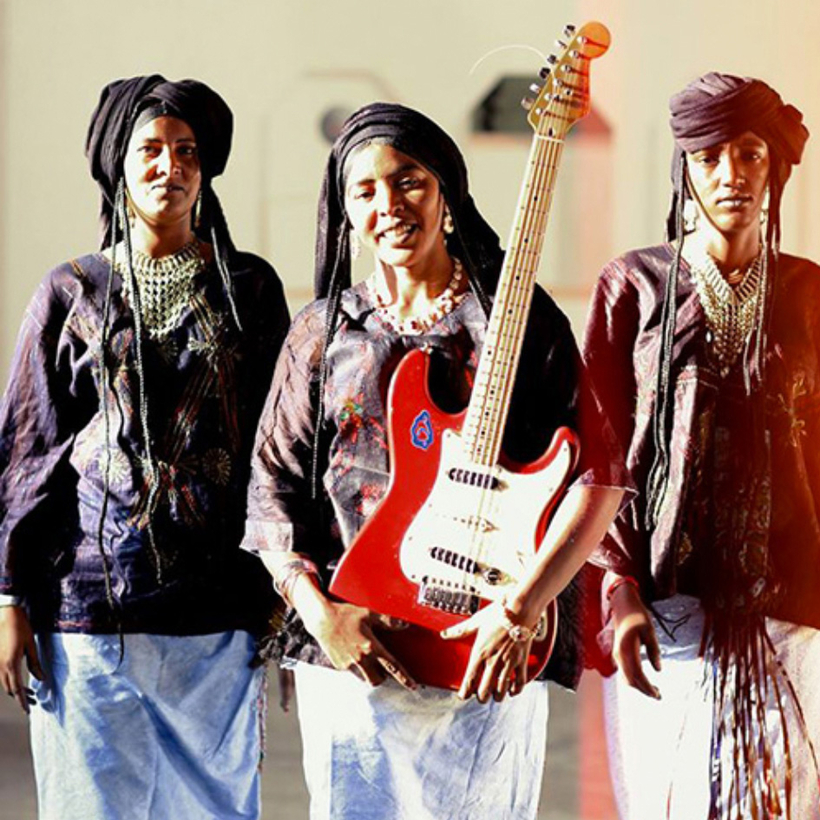February found us huddled around a black, Chinese-made smartphone in my translator’s cramped Ouagadougou apartment, in Burkina Faso, waiting for Fatou Seidi Ghali, the lead singer and guitarist of Les Filles de Illighadad, to pick up on the other end, in neighboring Niger. Frenetic phrases soon crackled over the line, and my translator, Mohamed, a Malian dancer currently living in exile in Burkina Faso, said the interview was off. Ghali’s husband had apparently heard his voice on the phone.
“He’s very jealous,” Ghali told us in Tamashek—the language of West Africa’s Tuareg people, from the Sahel region, which encompasses parts of Algeria, Burkina Faso, Mali, and Niger—when we finally got hold of her.
Tuareg culture is largely conservative, and portions of the Tuareg population throughout the region have united with jihadist groups, some of whom in the past have seized cities and put them under Islamic Sharia law, enforcing some of the harshest criminal punishments and allowing for virtually no rights for women. It doesn’t make for the most welcoming of environments for female musicians to achieve even local success, let alone international renown. And yet, just a year ago, Ghali and her three-woman/one-man band, which blends hypnotic finger-picking Sahelian guitar with vibrant tende music (traditionally performed by women on goatskin drums) and Tuareg chanting, were preparing for their second U.S. tour. Their first tour, in 2019, had taken them to Australia, Canada, Germany, Israel, Sweden, the U.K., and the U.S.

“Everyone on the West Coast was waiting for Les Filles,” their French band manager, Mathieu Petolla, said. But with around 30 sold-out shows canceled due to the pandemic, the three women and the “boom, boom, boom” momentum surrounding them came to a sudden halt.
Ghali and her three-woman/one-man band blend Sahelian guitar with tende music and Tuareg chanting.
Then, in the fall of last year, Ghali became the second wife of a long-haul desert driver, who told her she would not be allowed to perform publicly in Niger, and would be permitted to play only lucrative overseas shows, a condition she says she understood before she chose to marry him. Niger, a country with pockets of liberalism in the cities, remains largely traditional in the villages. In recent years there have been backlashes from some Islamic clerics against music and arts festivals and, more particularly, women’s participation in them.
“At home I continue to play my guitar, and I have even performed songs for [my husband], and he really loves seeing me playing guitar,” Ghali says.
Desert Blues
While Tuareg music has long been part of the music scene of France, which colonized Niger starting in the 1890s, the Sahelian-desert blues have become popular in the U.S. only in recent years, and musical traditions remain largely gendered. Ghali and her fellow band member Fatimata Ahmadelher are the only known women professionally playing Tuareg-style guitar in Niger.
Ghali, who grew up in a remote village in central Niger’s Illighadad, near the border with Mali, is an unlikely star. She was born into a traditional family of nine children, and her father wanted her to tend to their cows, get married, and become a housewife. When Ghali was 10 years old, her father tried to marry her off to an older cousin. In protest, she retreated into the bush, where she began playing a traditional three-stringed instrument in a style called takumba, as well as an acoustic guitar borrowed from a friend of her brother’s. Later, Ghali would play in front of family members and neighbors and at weddings.

In 2014, Christopher Kirkley, who runs the Portland, Oregon–based independent record label Sahel Sounds, stumbled upon a photo of Ghali on a musician’s Facebook page and traveled to Illighadad to meet her.
“She was kind of shy to play, and we thought, That’s it,” says Kirkley. “I was just about to leave and then I said, ‘Why don’t we record away from everybody?’” On a patch of grass under the shade of acacia trees, away from the family and neighbors who had gathered around, Kirkley recorded as Ghali played guitar and her friend Alamnou Akrouni performed tende. This recording—capturing Ghali’s timidity and excitement, the hum of cicadas, and the laughter of nearby children—became Les Filles’ first album, released in 2016. Within months, European venues started knocking. “It almost didn’t happen, and it’s remarkable that it did,” says Kirkley, who went on to produce a second studio album by Les Filles, recorded at Bear Cave Studios, in Cologne, Germany, in 2017.
For Petolla, who also manages other West African artists, Les Filles was never really a band so much as a group of women who played beautiful music in their spare time and who also wanted to travel and earn money. One band member has already left the group after having a child. “It’s a moving project,” he says.
“Everyone on the West Coast was waiting for Les Filles.”
Petolla has tentatively begun booking shows at U.S. venues for 2022, and Sahel Sounds is planning to release a new album—a live recording of Les Filles performing at Pioneer Works in Red Hook, Brooklyn, from their 2019 tour—this May.
These days, Ghali still strums at home, scrolling occasionally through photos of herself and other band members on tour, in front of airplanes on the tarmac, and at bus stops across Europe. For now, the photos remain on her phone.
Clair MacDougall is a Burkina Faso–based journalist. She has extensively covered life and conflict throughout the African continent
